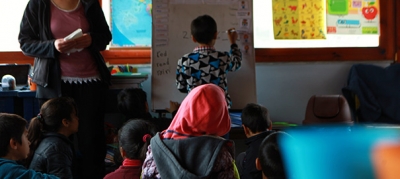Susan was distracted all morning. Not her normal self, she couldn’t seem to start working and played with her crayons during directions. She talked to her neighbour during work time. Mrs. Jenkins corrected Susan a little, but mostly watched and let it go as just an odd day for Susan.
At lunch, Mrs. Jenkins had her first break, fifteen minutes to eat quietly. She took her first bite when someone stood at the corner of her desk. It was Susan.
“Mrs. Jenkins, could you help me? I don’t know how to do our work from this morning and I don’t want to take it home.”
“If you had paid attention, it wouldn’t be a problem.” That is what Mrs. Jenkins thought as she laid down her sandwich. Instead, she looked in Susan’s eyes and said, “Yes. Let’s see what we can do.”
 When she finished, her break was gone. But, Susan was set.
When she finished, her break was gone. But, Susan was set.
This is love, God’s way. It is about what is best for someone else. It is about giving yourself, a sacrifice of some sort. It is about the thousands of moments and times teachers show God’s love by remembering His greatest gift to us and how much we don’t deserve it. And, then doing the same for a child.
Love, God’s way, is powerful. It breaks down barriers in lives and cultures and countries. Nothing can stop it as it seeps into hearts that are hungry for someone to care unconditionally, with nothing expected in return. It is radical in a world based on transaction. It is free. But, it requires sacrifice.
The life you give away is yours. While you may not physically die, your gift of your life for the sake of children demonstrates love, God’s way.
Whether rich or poor, Christian or not, everyone craves this love. “Good” kids need to know that this love can’t be earned; it is not bought with good behaviour. Messy kids need to know someone is on their side, even though that love is expressed through caring discipline. God’s love differentiates according to need and changes lives.
Christian or not, everyone craves this love. “Good” kids need to know that this love can’t be earned; it is not bought with good behaviour. Messy kids need to know someone is on their side, even though that love is expressed through caring discipline. God’s love differentiates according to need and changes lives.
As one of TeachBeyond’s core values, “love for others” brings purpose and power to what we do. It guides our words and choices both in the classroom and outside of it. It aligns our daily work with God, minute-by-minute, for any situation or place. Love is our method and our message. It is the goal of our instruction.[1] John tells us that it is how people know we are Jesus’ followers.[2]
This agapao type of love is not soft and sweet, although it can be. This love is not the world’s “love” that thinks first of hugs or chocolate or sex. God’s love is the sort that often acts in spite of the other person, not because of him or her. When God loved the world enough to give His only Son, it was not because He liked our sinful, messy, and rebellious world. This love takes strength and courage. It is not for the timid.[3]
Love, God’s way, has much more to do with choice and action than feeling, although often the feeling follows. This love shows itself in hugs and encouragement as well as discipline and demands. It acts in a way that is best for the other. It is hard work and empties us of self.
Last week, I sat with a team of TeachBeyond teachers in a sensitive country as they discussed Transformational Education. They are immersed in a world that strips away the easy answers. Each one of these experienced teachers talked about love as central to their job in the classroom.
And, they also understood that the only way to love like this is to first be loved by God and transformed by Him, to let the Holy Spirt make them different and empower them.
The beginning of love for others is to know and feel that you are loved. To meet God often enough to begin to understand the incomprehensible and overwhelming love He has for each of us. “We love, because He first loved us.”[4]
As Paul reminds us in Ephesians, may each of us “know the love of Christ which surpasses knowledge, that you may be filled up to all the fullness of God” and that we may see Him “do far more abundantly beyond all the we ask or think, according to the power that works within us.”[5] God makes loving others possible.
This is good news indeed. And students like Susan are counting on it.
Joe N., Th.M.
Elementary School Principal
Asia
[1] 1 Timothy 1:5
[2] John 13:35
[3] 2 Timothy 1:7
[4] 1 John 4:19
[5] Ephesians 3:19-20
Photo Credits: Teacher & Students. Global Partnership for Education – GPE Flickr via Compfight cc Veddah girl. Allesandro Pucci. via Wikimedia Commons. cc. Art Project. All 4Ed Flickr via Compfight cc
4Ed Flickr via Compfight cc
Joe has served in Christian school leadership in three schools over a span of 32 years, spending 14 of those as a headmaster and the rest as a principal. Additionally, Joe has been a speaker, writer, and consultant for Christian schools. He is now serving with TeachBeyond as an elementary principal in Asia.






 Melissa Gross, the director, says that when she first visited the school in 2010 it had 23 students. Enrollment had more than doubled when she returned as a faculty member in 2013. Today there are nearly 200 students in grades K-3 to 12. Cowman added grade 12 this year, and will graduate its first class of seniors in May 2019.
Melissa Gross, the director, says that when she first visited the school in 2010 it had 23 students. Enrollment had more than doubled when she returned as a faculty member in 2013. Today there are nearly 200 students in grades K-3 to 12. Cowman added grade 12 this year, and will graduate its first class of seniors in May 2019.
 When she finished, her break was gone. But, Susan was set.
When she finished, her break was gone. But, Susan was set. Christian or not, everyone craves this love. “Good” kids need to know that this love can’t be earned; it is not bought with good behaviour. Messy kids need to know someone is on their side, even though that love is expressed through caring discipline. God’s love differentiates according to need and changes lives.
Christian or not, everyone craves this love. “Good” kids need to know that this love can’t be earned; it is not bought with good behaviour. Messy kids need to know someone is on their side, even though that love is expressed through caring discipline. God’s love differentiates according to need and changes lives.
